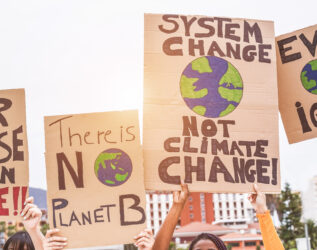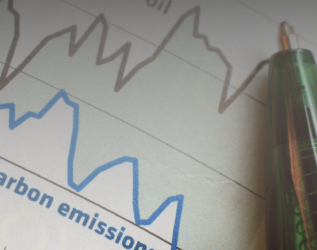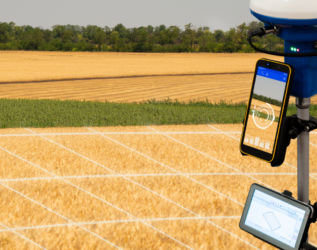5 companies to help you make a positive environmental impact

It’s difficult to not feel helpless in the climate crisis. As consumers, our actions can feel like a drop in the ocean. But, as the old saying goes, the ocean is made of drops. Better yet, if companies take positive climate action, the ripple effect is hugely amplified. Fortunately, as society increasingly feels the impacts of climate change, a rapidly rising number of startups are building solutions to tackle the problem. In fact, as TechCrunch reports, $40 billion was invested in climate tech startups across 600+ deals last year — that’s more than twice as much capital deployed than the previous year. Individually and collectively, we have an increasing amount of impactful choices we can make. In this blog we will discuss five companies that we can support and integrate into our personal and professional lives.
Tomorrow Bank
Let’s start with an easy product that everyone as individuals can turn to good use. Tomorrow Bank goes beyond profit-focused banking. It is also committed to sustainability and social equity. Did you know that most banks use our investments for adverse industries like coal and weaponry? To be fair, they don’t make that information very accessible, in fact, most don’t even ask you. Isn’t that wild? Fortunately banks like Tomorrow Bank exclusively invest in sustainable projects. Furthermore, for every euro paid with a Tomorrow card 1m² of rainforest is saved from deforestation. Their benefits feature also incentivizes users to take green actions such as purchasing energy from a clean energy provider, accompanied with partner discounts. You can sign up in a matter of minutes and can help protect the climate with every purchase.
Zolar
Calling all homeowners. One of the most effective ways to reduce your carbon footprint is switching to a clean energy provider. Going a step further by producing your own energy with companies like Zolar, you can reduce your carbon footprint even more. Zolar’s solar system platform is designed to help homeowners become energy independent. Becoming more energy independent means you don’t have to rely on dirty grids i.e. a country’s interconnected network for delivering electricity from producers to consumers, which often have high carbon emissions per unit of electricity (see a comparison of European countries here). As a bonus, it also makes sense financially, as you won’t be exposed to price spikes as a result of geopolitical or natural disaster reasons, which many of us may be experiencing right now.
Tesvolt
As a business, whether you are on-grid or off-grid, powered by the sun, wind, water or heat and power, Tesvolt’s wide range of sustainable energy storage solutions can be adapted to different requirements, from winemakers to apartment blocks to electric buses. And their solutions are competitively priced. Tesvolt will play a key role in accelerating the European energy transition from fossil-based systems of energy production and consumption to renewable energy sources. And if you are an installer, dealer or project developer, you can also partner with Tesvolt to help drive the energy transition.
Running Tide
In the B2B sector, many companies are purchasing carbon credits to eliminate their ongoing carbon footprint. For true, meaningful impact, it is important for companies to consider how direct the link is between the deployed activity and the positive climate result. Carbon capture technology companies like Running Tide make that link obvious, pointing to hard numbers of CO₂ removed. Running Tide captures CO₂ with kelp microforests and puts it back where it belongs by sinking it deep into the ocean. Kelp microforests are not only extremely effective at removing carbon, they are also very scalable due to the majority of earth’s surface being ocean and because they are grown far from shore where it doesn’t compete for land or coastal space. And as the system follows a natural and simple process, it unlocks low cost direct carbon capture. Companies such as Stripe and Shopify are partnering with Running Tide to help neutralise their generated residual carbon emissions. If you are a company interested in doing the same, contact their team.
Infarm
Here is a pioneer in the vertical farming sector. Both food retailers and consumers can pay attention to this one. Infarm’s vertical farms produce ready to transport, fresh, pesticide-free food that is closer to communities, eliminating travel emissions. IPCC has reported that transportation related emissions can account for more than half of emissions associated with food production, distribution and storage. If completely changing your diet, for example, switching to a plant-based one, is challenging for you, you could instead consider where your produce is coming from and the journey it has taken to arrive in your supermarkets. Infarm partners with over 30 of the world’s largest retail chains in Europe, North America and Asia, so keep an eye out for their brand. If you are a food retailer, consider stocking Infarm’s produce.
A parting piece of advice: invite more curiosity into your day-to-day decision making. Dig a little more into the products you purchase, whether that’s a fashion item’s delivery journey to your door, where your food has come from or how sustainable your energy provider is. If they have a negative environmental impact, look for alternatives. There are plenty out there. Also, challenge your employer and other organizations to prove they are paying more than just lip service to combat climate change. Change starts at an individual level but we also need to work collectively as a society to stop us going down a path of further destruction.











